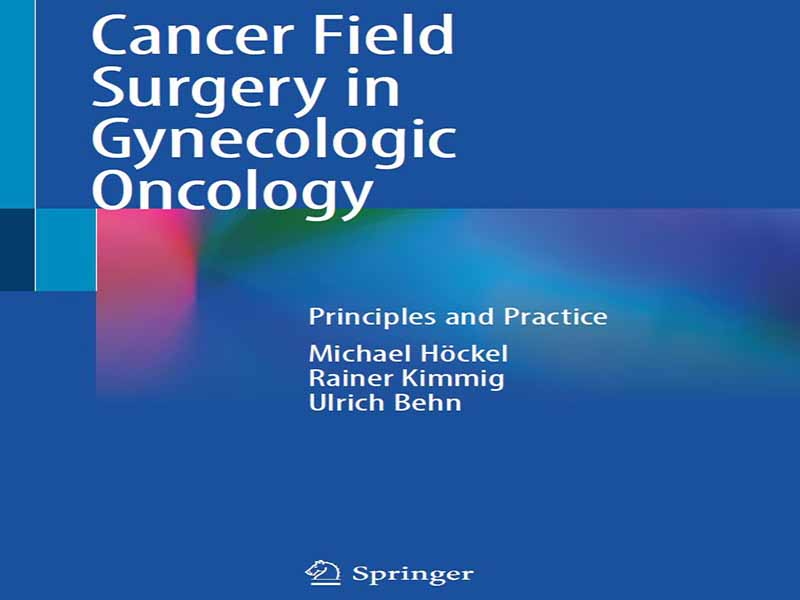- عنوان کتاب: Cancer Field Surgery in Gynecologic Oncology
- نویسنده: Michael H ckel, Rainer Kimmig, Ulrich Behn
- حوزه: جراحی سرطان
- سال انتشار: 2025
- تعداد صفحه: 276
- زبان اصلی: انگلیسی
- نوع فایل: pdf
- حجم فایل: 19.0 مگابایت
این پروژه کتاب، نشاندهندهی وضعیتی در یک اقدام علمی و بالینی بلندمدت است که به بینشها و نتایجی برای ساختاردهی و خلاصهسازی دست یافته است. هنگامی که مشخص شد مفاهیم سنتی پیشرفت موضعی سرطان به دلیل ناسازگاری با واقعیتهای بالینی باید کنار گذاشته شوند، رویکرد جدیدی، مدل میدان سرطان انتوژنتیکی، تکامل یافت. پیگیری توسعه سیستم تولید مثل زنان برای نقشهبرداری از آناتومی انتوژنتیکی آن، سرنخهایی برای الگوهای گسترش موضعی کارسینومهای دستگاه تناسلی تحتانی ارائه داد. این مدل، یک نظم تاکنون پنهان سرطان را آشکار میکند: تومورها به صورت موضعی در بافتها منتشر میشوند که با تمایززدایی متوالی سلولهای سرطانی، معکوس شدن مسیر تمایز نوع سلول طبیعی مربوطه در طول مورفوژنز، تعیین میشوند. این مدل به طور دقیق اختلافات موجود در مفهوم سنتی انتشار ایزوتروپیک سرطان را توضیح میدهد. علاوه بر این، درک دقیقی از آناتومی پیچیده زیرصفرا و دیدگاهی متفاوت در مورد پرینه از مطالعه مسیرهای انتوژنتیکی آنها ناشی شده است. این مدل، آناتومی جراحی مرسوم مصنوعات مبتنی بر تشریح و مرزهای بافتی دلخواه را منسوخ میکند. پیوند مدل میدان سرطان با مکانیسمهای تحمل ایمنی محیطی سلولهای طبیعی و تغییر شکلیافته و احترام به معماری شبکهای سیستم لنفاوی بر اساس توسعه آن، امکان تفسیری بیچونوچرا از الگوی متاستاز غدد لنفاوی را با توجه به خطوط دفاعی ایمونولوژیک اول، دوم و سوم، همانطور که در کارسینومهای دستگاه تناسلی تحتانی مشاهده شده است، فراهم کرد. ترجمه بالینی این الگوی جدید از میدانهای سرطان انتوژنتیکی به مرحلهبندی سرطان انتوژنتیکی و جراحی میدانی سرطان با تشریح غدد لنفاوی هدایتشده توسط خط دفاعی ایمونولوژیک که کاملاً بدون رادیوتراپی کمکی انجام میشود، منجر به نتایج درمانی برتر و پایدار شده است که اکنون با بیش از هزار بیمار در مراکز ما آشکار شده است. از سال ۲۰۰۵، اصول و شیوههای جدید در دانشکده جراحی رادیکال لگن لایپزیگ تدریس میشود. بسیاری از همکاران از سراسر جهان در دورههای برگزار شده در لایپزیگ، آلمان شرکت کردهاند و جراحی میدانی سرطان را در مجموعه آموزشی خود پیادهسازی کردهاند. هر دوره نه تنها تقاضای همکاران شاغل، بلکه دانشجویان پزشکی علاقهمند به درک عمیقتر از سرطانهای جامد را برای تدوین مطالب آموزشی در یک کتاب درسی افزایش داده است. وقتی نتایج برتر جراحی میدانی سرطان از آزمون زمان سربلند بیرون آمد و بسیاری از مراکز دیگر توانستند آنها را بازتولید کنند، سرانجام پروژه این کتاب آغاز شد. هدف این کتاب دستیابی به سه هدف است: خواننده باید (1) منطق مدل میدانی سرطان را درک کند، (2) با آناتومی انتوژنتیک لگن و پرینه زنان آشنا شود، و (3) بتواند جراحی میدانی سرطان را انجام دهد. این کتاب که با همکاری راینر کیمیگ، که جراحی میدانی رباتیک سرطان را برای درمان سرطان آندومتر توسعه داده است، نوشته شده است، رویکردهای فنی بهینه موجود تا به امروز را برای جراحی سرطان زنان طبق این الگو معرفی میکند. این کتاب به دو بخش تقسیم شده است: مبانی و کلینیکها. اگرچه بخش مبانی با معرفی الگوی میدانهای سرطان انتوژنتیک به خواننده، اطلاعات مفیدی را برای تمرین جراحی میدانی سرطان ارائه میدهد، اما درک این متن نسبتاً بلندپروازانه برای توانایی بازتولید تکنیکهای جدید جراحی ضروری نیست. بخش کلینیکها، جراحی میدانی سرطان را برای درمان سرطان زنان گام به گام توصیف میکند و تمام جنبههای عملکرد بینقص آن را روشن میسازد. شکلها به شکل نقشههای شماتیک و آناتومیک و همچنین عکسها در اولویت بالایی قرار دارند. دو هنرمند، نیکولاس لشنباور و مارا سندراک، این کار دشوار را با امضاهای زیباییشناختی شخصی خود برای آگاهسازی و جذب خواننده انجام دادند. مارا سندراک و آنجلا استلر با استفاده از عکسهای گام به گام رویهای، بر چالش به تصویر کشیدن لگن عمیق با بالاترین دقت و وضوح تسلط یافتند. الگوی میدانهای سرطان آنتوژنتیکی، اعتبار عمومی را ادعا میکند. فیزیکدان نظری، اولریش بن، استدلالهای خود را برای سازگاری به طور کامل آزمایش کرد و در پایان این کتاب، گفتمان مختصری از مدل میدان سرطان را در زمینهای گستردهتر به طور مشترک تألیف کرد. نویسندگان مدیون پروفسور بحریه آکتاش، رئیس بیمارستان زنان دانشگاه لایپزیگ، برای حمایت مداوم هستند. M.H. به ویژه از پروفسور توماس کان، مدیر سابق مؤسسه رادیولوژی دانشگاه لایپزیگ برای ارائه اسکنهای MRI، از پروفسور لارس-کریستین هورن، مؤسسه پاتولوژی دانشگاه لایپزیگ برای تهیه میکروفتوگرافیهای مقاطع بافتشناسی و از کاتیا اشمیت برای مراقبت طولانی مدت مهربانانهاش از بیماران ما سپاسگزار است. از بنیاد تحقیقات زنان و زایمان در بیمارستان دانشگاه اسن برای تأمین بودجه تشکر میکنیم. از تلاشهای ویراستاری و انتشاراتی اشپرینگر نیچر قدردانی میشود.
This book project marks a state in a long-term scientific and clinical enterprise that has achieved insights and results to be structured and summarized. When it became apparent that traditional concepts of local cancer progression had to be abandoned due to incompatibilities with clinical facts, a new approach, the ontogenetic cancer field model, evolved. Pursuing the development of the female reproductive system to map its ontogenetic anatomy provided clues for local spread patterns of lower genital tract carcinomas. The model unveils a so far hidden order of cancer: Tumors propagate locally within tissues, which are determined by successive de-differentiation of the cancer cells, a reversion of the corresponding normal cell type’s differentiation trajectory during morphogenesis. This model stringently explains the discrepancies in the traditional isotropic cancer spread concept. Moreover, a precise understanding of the complex anatomy of the subperitoneum and a different view on the perineum arose from the study of their ontogenetic pathways. It renders the conventional surgical anatomy of dissection-driven artifacts and arbitrary tissue boundaries obsolete. Linking the cancer field model to mechanisms of peripheral immune tolerance of normal and transformed cells and respecting the network architecture of the lymphatic system based on its development allowed an unequivocal interpretation of the pattern of lymph nodal metastasis with regard to first, second, and third immunologic defense lines as observed with carcinomas of the lower genital tract. The clinical translation of this new paradigm of ontogenetic cancer fields into ontogenetic cancer staging and cancer field surgery with immunologic defense line- directed lymph node dissection totally dispensing with adjuvant radiotherapy has led to sustainable superior treatment results, now manifested with more than one thousand patients in our centers. Since 2005, the new principles and practice are taught at the Leipzig School of Radical Pelvic Surgery. Many colleagues from all over the world have attended the courses held in Leipzig, Germany, and implemented cancer field surgery in their armamentarium. Each course increased the demand not only of practicing colleagues but also of medical students interested in a deeper understanding of solid cancers to compile the educational contents in a textbook. When the superior results of cancer field surgery passed the test of time and many other centers were able to reproduce them, this book project was finally started. The book aims to fulfill three goals: the reader should (1) understand the logic of the cancer field model, (2) become familiar with the ontogenetic anatomy of the female pelvis and perineum, and (3) be enabled to practice cancer field surgery. Co-authored by Rainer Kimmig, who developed robotic cancer field surgery to treat endometrial cancer, the book introduces the optimal technical approaches available to date to operate gynecologic cancer according to the paradigm. The book is divided into two parts: Basics and Clinics. Although the Basics part provides useful information to practice cancer field surgery by introducing the reader into the paradigm of ontogenetic cancer fields, the comprehension of this rather ambitious text is not essential to become able to reproduce the novel surgical techniques. The Clinics part describes cancer field surgery for the treatment of gynecologic cancer step by step, elucidating all aspects of its perfect performance. Figures in the form of schematic and anatomical drawings as well as photographs are placed at high priority. Two artists, Nikolaus Lechenbauer and Mara Sandrock, accomplished this demanding task with their personal aesthetic signatures to inform and engage the reader. Mara Sandrock and Angela Steller took the step-by-step procedural photographs mastering the challenge of depicting the deep pelvis with highest precision and resolution. The paradigm of ontogenetic cancer fields claims general validity. The theoretical physicist Ulrich Behn thoroughly tested its arguments for consistency and co-authored a brief discourse of the cancer field model in a broader context at the end of this book. The authors are indebted to Professor Bahriye Aktas, Chairwoman of the Women’s Hospital at the University of Leipzig, for continuous support. M.H. is partucularly grateful to Professor Thomas Kahn, former Director of the Institute of Radiology, University of Leipzig for providing the MRI scans, to Professor Lars-Christian Horn, Institute of Pathology, University of Leipzig for producing the microphotographs of the histological sections and to Katja Schmidt for her kind long-term care of our patients. We thank the Stiftung Gynäkologische Forschung at the University Hospital of Essen for funding. The editorial and publishing efforts of Springer Nature are acknowledged.
این کتاب را میتوانید از لینک زیر بصورت رایگان دانلود کنید:




































نظرات کاربران